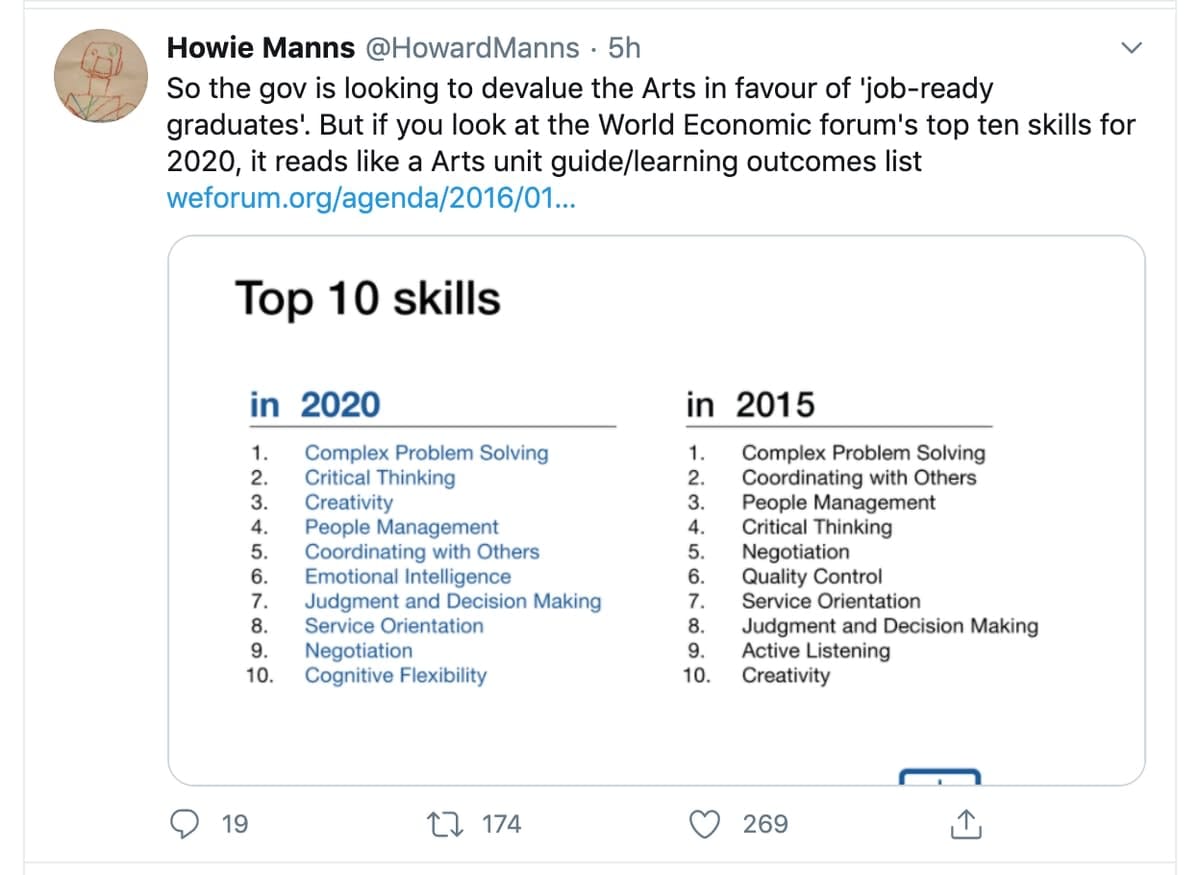
The federal government’s juggling act with university funding today – making some arts and humanities courses more than twice as expensive, but “job-relevant” courses cheaper – is “unfortunate and misplaced”, says Monash University’s Dean of the Faculty of Arts, Professor Sharon Pickering.
In the wake of the government’s surprise announcement, Professor Pickering sent an appeal to the federal Minister for Education, Dan Tehan, to look at the evidence around humanities and social science (HASS) degrees “regarding the value and employability” of graduates.
More broadly, she said HASS graduates, at a challenging time in world history, should be recognised for their “importance for the Australian nation across a whole range of industries, but also for Australia’s leadership in the region … at precisely the time this is most needed”.
Arts graduates possessed “so-called soft skills”, she told the ABC, but skills that were resistant to automation and economic downturn, such as “creativity and originality, problem-solving, analytical thinking, leadership and social influence, emotional intelligence, resilience – it goes on”. Many of these were specifically mentioned in the government’s own Skills for The Future document, released last year, she said.

Arts-based tertiary education led to “very high” employability, she said, on a par with those graduates coming from STEM (science, technology, engineering, mathematics), citing recent data by London Economics and The British Academy showing arts, humanities, and social sciences graduates fuelling fast-growing, well-paid sectors of industry. The UK report also identified HASS graduates as essential for “workplace gaps of the future, particularly those studying fine arts, history and archaeology, philosophy and theology, geography, sociology and anthropology”.
It said while STEM graduates gravitated towards the health sector, HASS graduates could find work in a “wide range” of sectors, including “financial services, education, social work, the media and creative industries”.
HASS graduates in high demand
Professor Pickering said the tertiary sector was the provider of these graduates in Australia, who were in “high demand”. Monash Arts has an 88 per cent graduate employability rate, which is on par with STEM graduate employability, she said.
“It is regrettable they [the government] have sought to shift the burden of payment – a cost shift to students – at precisely the time our employers are demanding our graduates. Job prospects in these areas are, in fact, very strong.”
Nursing, psychology, English, languages, teaching, agriculture, maths, science, health, environmental science and architecture will be cheaper, according to the statement, as the government increases its contribution to the cost of the courses. But students studying law, commerce and humanities will face steep hikes in fees, with humanities more than doubling.
“That means the student body is likely to be less diverse and less representative of merit, and much more likely about who can afford to pay,” Professor Pickering says. “These are not the future leaders we want to be working towards; we want to be able to ensure that our nation is well-served by students equipped with these skills, regardless of their means to pay.”

In 2018, Professor Pickering launched Monash University’s Global Immersion Guarantee program for arts students, in which they could apply for funded study in overseas locations including Malaysia, Prato (Italy) and Indonesia.
“The Bachelor of Arts at Monash sets up students for the rapidly changing future world of work, and their contribution to this changing world, through ensuring they’re capable of undertaking the critical thinking necessary to make sense of the big global developments in their futures,” she said when announcing the program.
Critical thinkers needed now more than ever
In a Monash Arts graduation speech the previous year, Dr Susan Carland, from the School of Languages, Literature, Cultures and Linguistics, said HSS graduates were more valuable than ever in an era of confusing media messages and polarised opinions.
“We need people who know not just what to think, but more importantly, how to think. Right now, more than ever, we need critical thinkers. And critical thinking is the crucial skill that an arts degree teaches,” Dr Carland said.
“We desperately need minds that can negotiate, minds that can distinguish fake from fact, opinion from thought, argument from debate, and hashtag from logic. Minds that can sit with the tension of cognitive dissonance while they work out what’s really going on, what really matters, what’s really real.”
Dr Carland said an arts degree may not lead graduates to building skyscrapers or artificial limbs, but to building better societies: “A society that sincerely considers the views of others, that questions and holds power to account, that is willing to change its mind when it is going the wrong way, and is full of members that put the needs of others ahead of their own,” she said.





